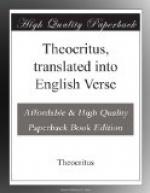Had I but Croesus’ wealth,
we twain should stand
Gold-sculptured in Love’s temple; thou,
thy lyre
(Ay or a rose or apple) in thy hand,
I in my brave new shoon and dance-attire.
Fairy Bombyca! twinkling dice thy feet,
Poppies thy lips, thy ways none knows how sweet!
MILO.
Who dreamed what subtle strains our bumpkin wrought?
How shone the artist in each measured verse!
Fie on the beard that I have grown for naught!
Mark, lad, these lines by glorious Lytierse.
[Sings]
O rich in fruit
and cornblade: be this field
Tilled well, Demeter,
and fair fruitage yield!
Bind the sheaves, reapers:
lest one, passing, say—
‘A fig for these, they’re never
worth their pay.’
Let the mown swathes look northward,
ye who mow,
Or westward—for the ears grow fattest
so.
Avoid a noontide nap, ye threshing
men:
The chaff flies thickest from the corn-ears
then.
Wake when the
lark wakes; when he slumbers, close
Your work, ye
reapers: and at noontide doze.
Boys, the frogs’
life for me! They need not him
Who fills the
flagon, for in drink they swim.
Better boil herbs,
thou toiler after gain,
Than, splitting
cummin, split thy hand in twain.
Strains such as these, I trow,
befit them well
Who toil and moil
when noon is at its height:
Thy meagre love-tale, bumpkin,
though shouldst tell
Thy grandam as
she wakes up ere ’tis light.
IDYLL XI.
The Giant’s Wooing
Methinks all nature hath no
cure for Love,
Plaster or unguent, Nicias,
saving one;
And this is light and pleasant
to a man,
Yet hard withal to compass—minstrelsy.
As well thou wottest, being
thyself a leech,
And a prime favourite of those
Sisters nine.
’Twas thus our Giant
lived a life of ease,
Old Polyphemus, when, the
down scarce seen
On lip and chin, he wooed
his ocean nymph:
No curlypated rose-and-apple
wooer,
But a fell madman, blind to
all but love.
Oft from the green grass foldward
fared his sheep
Unbid: while he upon
the windy beach,
Singing his Galatea, sat and
pined
From dawn to dusk, an ulcer
at his heart:
Great Aphrodite’s shaft
had fixed it there.
Yet found he that one cure:
he sate him down
On the tall cliff, and seaward
looked, and sang:—
“White Galatea, why
disdain thy love?
White as a pressed cheese,
delicate as the lamb,
Wild as the heifer, soft as
summer grapes!
If sweet sleep chain me, here
thou walk’st at large;
If sweet sleep loose me, straightway
thou art gone,
Scared like a sheep that sees
the grey wolf near.
I loved thee, maiden, when




